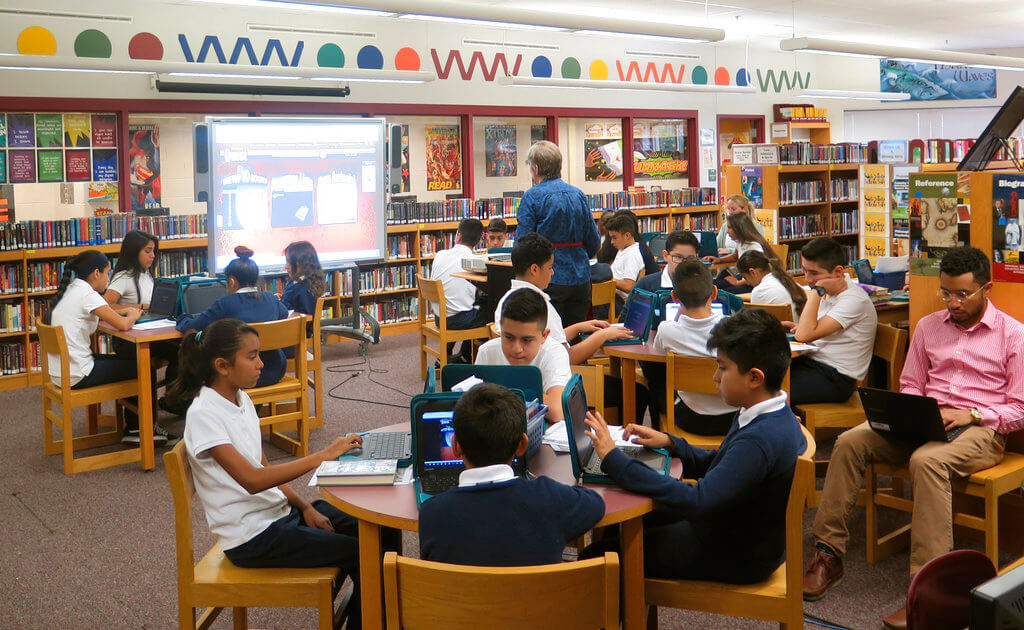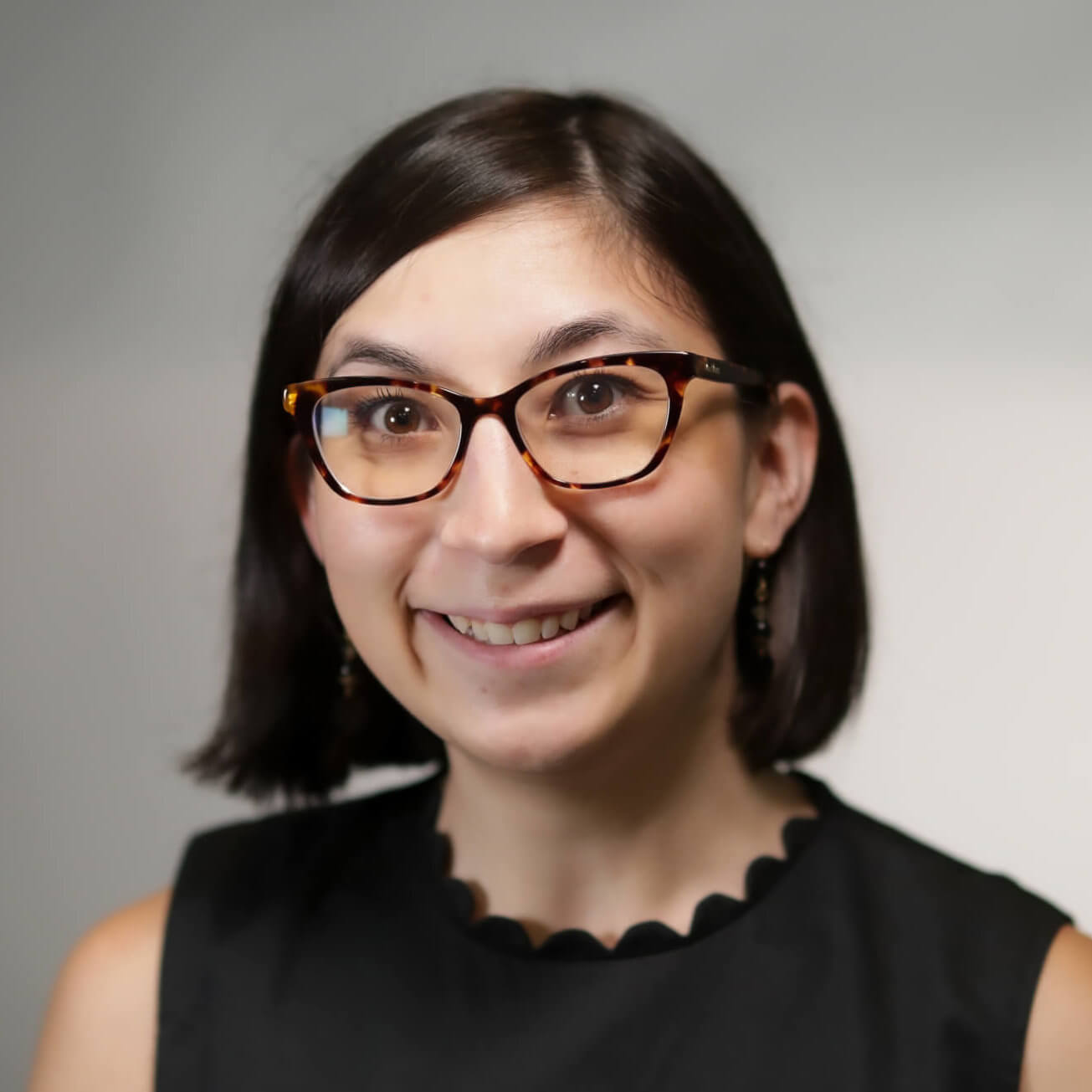
In this Sept. 27, 2017 photo students learn about searching for books and keeping track of what they've read in their school library. (AP Photo/Ivan Moreno)
Lately, it seems like discussions about banning “questionable” books in public schools have been spreading like wildfire — not just in Virginia, in places like Loudoun County, that could be considered “Ground Zero” around educational fights, but across the country.
In neighboring Tennessee, Maus, a Pulitzer-winning graphic novel by Art Spiegelman about his parents’ experience during the Holocaust, was banned in McMinn County Schools “because of its unnecessary use of profanity and nudity, and its depiction of violence and suicide.” The school board also felt that the book was too “adult-oriented” for use in schools. The book was being taught as part of the district’s eighth-grade language arts curriculum.
Roughly a week after the school board voted to ban the book, a pastor from Mt. Juliet organized a book-burning event for books deemed “demonic,” including revered series like Harry Potter and Twilight.
What’s Been Questioned in the Commonwealth?
Across Virginia, there are at least nine school divisions that have either tried to enact book bans and failed, have successfully banned books from their schools’ libraries, or are in the process of looking over “questionable” books that some parents—or in some cases, a singular parent—have objected to.
In November 2021, Spotsylvania County Public Schools came under fire when their school board ordered librarians across the district to remove “sexually explicit” books after one parent raised some concerns about books that were available through Riverbend High School’s digital library app. Two school board members also advocated for burning books.
The book in question that a parent took offense with? 33 Snowfish by Adam Rapp, which was named a “Best Book for Young Adults” in 2004.
One school board member, Rob Abuismail, wanted the division to do an immediate audit of all books in its libraries. He also didn’t like the idea of 33 Snowfish being on shelves, because according to him, having it in the library meant public schools “would rather have our kids reading gay pornography than about Christ.”
Other books that have been up for recent questioning in Virginia’s schools include Toni Morrison’s Beloved and The Bluest Eye, The Kite Runner by Khaled Hosseini, Hurricane Child by Kacen Callender, Cat Clarke’s The Pants Project, Lawn Boy by Jonathan Evison, Jeannette Walls’ The Glass Castle, Monday’s Not Coming by Tiffany D. Jackson, and even A Lesson Before Dying by Ernest J. Gaines. A majority of these books were either written about racial disenfranchisement, LGBTQ issues, or were written by authors of color.
There have also been books that have recently received bans in Virginia’s schools, including Gender Queer: A Memoir by Maia Kobabe, Out of Darkness by Ashley Perez, and The Poet X by Elizabeth Acevedo.
School libraries should be as diverse as the populations that they serve, whether it’s in a small, rural community or if it’s an inner-city school division. “Schools should be an equitable environment for all,” said Rasha Saad, a Loudoun County parent, during a “Book Ban Busters!” webinar.
It should also be noted that many of the books that are up for questioning about their content aren’t actually being taught in schools. Instead, the books are on shelves of school libraries, allowing students to gain broader perspectives into the world around them.
Much of the debate around books with “questionable content” stems from the fight that conservatives have brought to the forefront of school politics: critical race theory (CRT)—which isn’t actually taught in Virginia’s schools!
If parents who are concerned about their children having access to “questionable content” were truly concerned about their kids reading about “sexually explicit” or violent things, then they would be on missions to remove books considered to be “the classics” from schools. Works by authors like Shakespeare, Hemingway, and even The Bible would be under fire for their content.
Instead, it’s books by minorities that are under fire. In some schools across the country, only parts of book series have been removed, leaving out the stories in the series about people of color, while only leaving behind stories about white people.
Education and the General Assembly
In Virginia’s General Assembly, there are also several pieces of legislation that have been drafted that deal with topics associated with the aforementioned educational topics that have supposedly “divided” citizens.
One bill in particular, HB 787, was up for discussion Feb. 8, ultimately passing through the subcommittee. The bill, introduced by Del. Dave LaRock, doesn’t explicitly say it’s an anti-CRT bill, is a wolf in sheep’s clothing. The bill would ban “divisive concepts” from being taught in Virginia’s elementary and secondary schools. It would also punish teachers and educators for discussing topics that are deemed “divisive” by the government. It’s a bill that seeks to censor what kids are learning in the classroom, which would also limit the types of literature students would have access to.
A similar bill, HB 781, introduced by Del. Wren Williams, also a co-patron of HB 787, explicitly states what “divisive concepts” are that shouldn’t be taught in Virginia’s schools.
As used in this section, “divisive concept” means the concept that (i) one race, religion, ethnicity, or sex is inherently superior to another race, religion, ethnicity, or sex; (ii) an individual, by virtue of the individual’s race, religion, ethnicity, or sex, is inherently racist, sexist, or oppressive, whether consciously or unconsciously; (iii) an individual should be discriminated against or receive adverse treatment solely or partly because of the individual’s race, religion, ethnicity, or sex; (iv) members of one race, religion, ethnicity, or sex cannot and should not attempt to treat others without respect to race, religion, ethnicity, or sex; (v) an individual’s moral character is necessarily determined by the individual’s race, religion, ethnicity, or sex; (vi) an individual, by virtue of the individual’s race, religion, ethnicity, or sex, bears responsibility for actions committed in the past by other members of the same race, religion, ethnicity, or sex;
HB 781 Text
HB 570, essentially failed, as it was passed by indefinitely for the rest of the General Assembly session, dying on a party line vote.
Even though Republicans have control of Virginia’s House, Democrats still have a very slim majority in the Senate, showing that the debate over book bans, “inherently divisive concepts,” and even what can or can’t be taught to students in schools will be continuing on with a fierce battle.
“To take away these voices; these stories from our students who are the most marginalized and who are the ones that will most benefit from these voices is simply unacceptable,” Saad said.

Here’s everything you need to know about this month’s Mercury retrograde
Does everything in your life feel a little more chaotic than usual? Or do you feel like misunderstandings are cropping up more frequently than they...

VIDEO: Check out Dogwood’s new merch line
Big news, Virginia! We've officially launched our Dogwood merch line 🎉 This year, we celebrate 5 years of bringing you Virginia news you can use....

VIDEO: Your support matters!
Your support matters! Donate today. @vadogwoodnews Your support matters! Visit our link in bio to donate today. #virginianews #virginia #community...

Op-Ed: Virginia’s new Democratic majorities pass key bills to improve your lives, but will Youngkin sign them?
The 2024 Virginia General Assembly regular session has wrapped up. It was a peculiar session from the outset, with Democratic majorities in the...

From the state rock to the state flower, here’s how Virginia got its symbols
Have you ever wondered why the Dogwood is the state flower? Or how the cardinal became the state bird? We’re here to answer those questions and more...

VIDEO: Second-gentleman Douglas Emhoff gives speech on reproductive freedom
Second gentleman, Douglas Emhoff touched on reproductive freedom not only being a woman's issue but "an everyone's issue" during the Biden-Harris...





